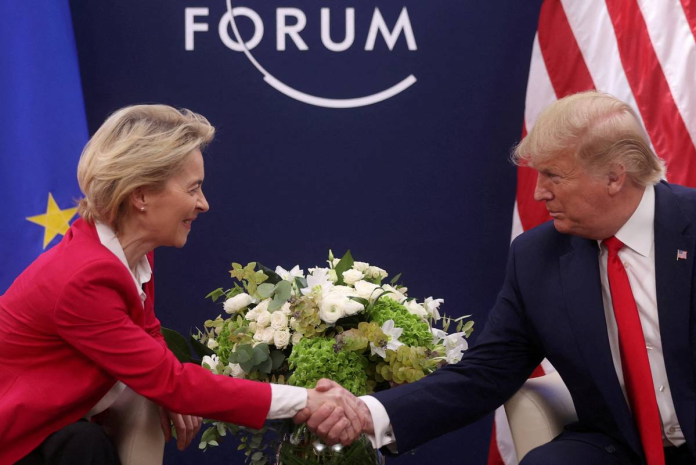European trade ministers gathered in Brussels on Monday to formulate a collective response following US President Donald Trump’s unexpected announcement of 30% tariffs on EU goods, according to AP News.
The move, set to take effect on 1 August, threatens to inflate prices of French cheese, Italian leather, German electronics, and Spanish pharmaceuticals in the US, destabilising economies across the continent.
Denmark’s Foreign Minister Lars Løkke Rasmussen set a measured tone ahead of the meeting:
We shouldn’t impose countermeasures at this stage, but we should prepare to be ready to use all the tools in the toolbox. So we want a deal, but there’s an old saying: ’If you want peace, you have to prepare for war.’
In a conciliatory gesture, the European Commission suspended retaliatory tariffs scheduled for Monday, delaying EU countermeasures until 1 August. European Commission President Ursula von der Leyen confirmed the timeline, noting Trump’s letter showed “that we have until the first of August” to negotiate.
Meanwhile, EU Trade Representative Maroš Šefčovič stressed the urgency of dialogue. He warned that “the current uncertainty caused by unjustified tariffs cannot persist indefinitely,” indicating readiness for “well-considered proportionate countermeasures.”
Political backlash and leadership scrutiny
The tariffs ignited fierce criticism from former Italian Prime Minister Giuseppe Conte, who accused current Premier Giorgia Meloni of vanishing after “flaunting a central role in negotiations with Trump for ‘zero’ tariffs.”
In a social media post, Conte demanded that Meloni “have the humility to listen.” He condemned concessions to Trump – including tax breaks for “American web billionaires” and guaranteed gas purchases – as “an irresponsible surrender” that stripped Italy of negotiating power.
Conte warned the tariffs could cost Italy “35 billion and nearly 200,000 jobs,” concluding:
We deserve leaders who, when they speak of their homeland, act accordingly, with their backs straight.
Facing sustained pressure from Washington, the EU is accelerating efforts to diversify trade partnerships. Šefčovič highlighted the bloc’s new economic agreement with Indonesia. Von der Leyen affirmed the strategy, stating:
When economic uncertainty meets geopolitical volatility, partners like us must come closer together.
Upcoming summits with China and outreach to Pacific nations including South Korea, Japan, and Vietnam also signal Europe’s recalibration away from US dependency.
